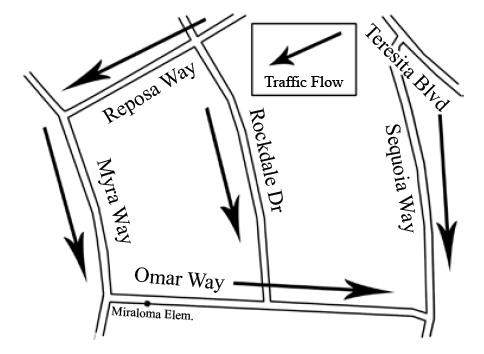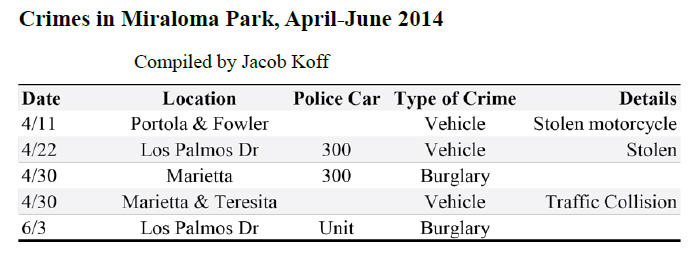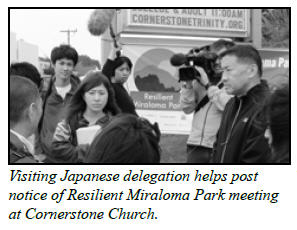News & Events
Miraloma Life: September 2014
- Seniors Resource Fair
- Resilient Miraloma Park’s Amazing Launch
- From the President’s Desk
- Miraloma Elementary School Traffic Plan
- Miraloma Elementary is hiring “Noon Monitors”
- Summary of MPIC Board Meetings of June 5 and August 7, 2014
- From the MPIC Safety Committee
- Water Conservation Message from SFPUC
- What’s Growing in Our Backyards?
- MPIC Election Results
- Miraloma Park Meets Survivors of the Tohuku Earthquake and Tsunami
Seniors Resource Fair
by Kathy Rawlins, MPIC Director
On Friday, September 19 from 3 to 6 pm the MPIC will host a fair at the Clubhouse presenting resources for seniors, the elderly, and disabled, which will highlight agencies and services available in SF. Participating agencies will include the Institute on Aging, the City and County of SF’s Aging and Adult Services, On Lok, and San Francisco SAFE. These agencies and others will provide information on transportation, medical care, financial assistance including tax preparation, awareness of fraud scams targeting seniors, and assistance with in-home upkeep. The fair is for all seniors and family and friends of seniors who could benefit from the many programs and services. Admission is free and light refreshments will be served.
Resilient Miraloma Park’s Amazing Launch
by Daniel Homsey, MPIC Director, Resilience Committee
We successfully launched Resilient Miraloma Park on June 18 at the Cornerstone Trinity
Baptist Church on Teresita (see photos below). With over 60 residents attending, the evening was both a community celebration and an opportunity for residents to share what they love about Miraloma Park and the efforts they want to make to ensure a strong future for our neighborhood.
On July 25 the community met again to discuss the challenges to be faced given the growing likelihood of heatwaves striking our community and how we can ensure that everyone survives, including our most vulnerable. On August 20, a third meeting at the Church, “How We’re Going to Roll—When Things Rock,” addressed our response to earthquakes. Two additional meetings will follow.
Resilient Miraloma Park is a strategic partnership between the MPIC and the members of the City’s Neighborhood Empowerment Network (NEN). NEN comprises agencies that support communities’ efforts to become more resilient in the face of disasters and emergencies. Agencies working alongside MPIC’s leaders to advance this program include the Mayor’s, City Administrator’s, and Supervisors’ offices, as well as the Department of Health, the Neighborhood Emergency Response Team (NERT), the Human Services Agency, the Public Utilities Commission, SF Police and Fire, and the Department of Emergency Management.
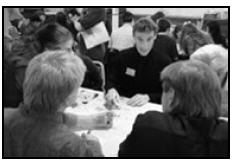
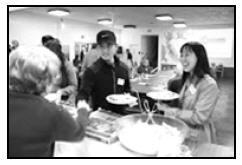
A key partner is the MIT Urban Risk Lab, which is donating its staff’s time to provide participants with amazing maps and data visualizations so that they can work as teams to craft a collective vision for the neighborhood. Neighborland, Nextdoor, and SF SAFE are also partners this effort. Resilient Miraloma Park is using the NEN’s “Empowered Communities Program” to bring all of the above contributors together in order to generate a Resilience Action Plan that the MPIC will use as a roadmap to guide future investments in the neighborhood’s physical and social capacities. Our goal is to ensure that no matter what kind of stress we encounter as a community we will recover with as little loss of property and human suffering as possible.
Three Resilience meetings remain, including the Earthquake presentation on August 20. We encourage everyone to attend as many of the remaining Resilience meetings as possible and contribute ideas and goals to the developing Resilience Action Plan. To learn more about Resilient Miraloma Park and to register for an upcoming meeting, please visit www.resilientmiralomapark.org. If you have any questions for me directly, email me at danielhomsey@yahoo.com.
From the President’s Desk
by Robert Gee, MPIC President
A New MPIC Director
I am pleased to report that I have appointed Bill Kan as interim MPIC Director (to be confirmed by vote at the next membership meeting with a quorum). Bill and his wife moved to Miraloma Park over a year ago, after which they became members and he attended some of our monthly Board meetings and contributed to our discussions. Miraloma Park residents and MPIC members are always welcome at the monthly Board meetings, but in my 6 years on the Board I’ve never seen a neighbor attend as many as Bill. Given his evident interest, I appointed him to the Board and he has agreed to chair our Membership Committee. As a financial analyst who calls himself a “data geek,” he has already come up with some technical innovations and fresh ideas on how to maintain and build our membership. I hope other curious neighbors will do as Bill did, come to Board meetings, find out what we do and where their interests may lie, and then lend their own expertise to our efforts on behalf of the community as Directors or independent contributors.
Department of Public Works (DPW) Services
At our June Board meeting, Ahmad El-Najjar, Public Information Officer for DPW, spoke about the services his agency can provide. In a very effective presentation, he made it clear that DPW truly wants to reach out and help solve our problems, so I want to share with you what his department can offer.
A DPW Public Information Officer (PIO) is assigned to our community. Her name is Ennis Harris and she can be contacted at Ennis.harris@sfdpw.org or 641-2659. The PIO’s primary role is to work with the general public, residents, merchants, and private property owners to:
• Provide information on cleanliness standards
• Prevent illegal dumping
• Investigate complaints
• Enforce City codes
• Resolve issues and concerns raised by the public
• Work with private and other City agencies to solve problems
• Inspect City streets and sidewalks on foot
• Write citations and Notices of Violation when warranted
• Ensure all property owners maintain adequate garbage service.
As part of the DPW Outreach and Enforcement Team, the PIO has a strong community presence, educating merchants, property owners, and residents in their rights and responsibilities regarding street and sidewalk cleanliness and enforcing city codes to ensure sanitation standards are met. The team also serves as a liaison between the public and other Public Works bureaus.
So besides calling the 311 City Service Hotline (where sometimes you may not get a response), consider reaching out to Ennis Harris if you encounter any of the problems listed above.
Resilient Miraloma Park
Thank you to everyone who attended one or more of our Resilient Miraloma Park community meetings. Attendance at our June and July meetings exceeded expectations. Walking among the tables, I was impressed to find every participant fully engaged in the different exercises and contributing thoughts and ideas. Our resiliency plan will be based on input from our community, and many people remarked that it was nice to meet their neighbors for the first time.
A lot of planning goes into the preparation for each community meeting we hold. I want to thank our key partners, teams from the City’s Neighborhood Empowerment Network and the MIT Urban Risk Lab. They are providing the MPIC and our community the technical expertise, guidance, and resources to design a unique Resilient Action Plan (for more on this, see Daniel Homsey’s article in this issue).
A recent Resilience planning meeting at my house was attended by Richard Serino, who was Deputy Administrator for the Federal Emergency Management Agency (FEMA) from 2009 to 2013. He brought 35 years of state and local emergency management and emergency medical services experience to FEMA, having previously served as Chief of Boston Emergency Medical Services
and Assistant Director of the Boston Public Health Commission, and assisted in many disasters across the country. Now an advisor for the MIT Urban Risk Lab, Richard embodies the high level of expertise and commitment in our Resilient Miraloma Park program. We are grateful for his local participation, which underscores the importance we place on the Resilience initiative and reinforces that disaster planning starts at the community level.
Supervisor Norman Yee’s Participatory Budget Project
In November of 2013, Supervisor Yee invited me to participate on a District 7 community council he had created to work on the roll-out of the participatory budget project for our district. In May of this year, the process culminated with a week of voting throughout the district. Over 1000 people voted; in contrast, in Districts 3 and 10 only 300 people participated.
The final votes are in. The people of District 7 selected 15 projects from those proposed, as follows.
Safety and Traffic Category Winners:
1. Make the crosswalk at O’Shaughnessy and Del Vale Safer ($20,000)
Submitted by Miraloma Park resident Steve Hess, this project received the highest vote count (407) in its category. I thank Steve for his tireless efforts to get the City to make that intersection safe for pedestrians and to get Miraloma Park neighbors to vote for this. The proposal includes building a safety island and making a highly visible crosswalk. Construction should begin shortly.
2. Safety Study for Laguna Honda and Dewey Boulevard ($20,000)
3. Interactive speed limit sign for Clarendon School Zone ($20,000)
4. Traffic Calming for 14th Avenue ($20,000)
5. Sunnyside Park Safe Access Study ($5,000)
6. Interactive speed limit sign on Alemany Blvd ($20,000)
7. Interactive speed limit sign on Panorama Drive ($20,000)
8. Traffic Calming for Balboa Terrace ($15,000)
9. Interactive speed limit sign on Olympia Way ($20,000)
Beautification, Open Space Access and Improvement, and Community Services and Neighborhood Enhancements Category Winners:
1. Better amenities for Golden Gate Heights Park ($23,000)
2. A pathway for a better West Portal ($15,000)
3. A parklet for West Portal Avenue ($15,000)
4. A makeover for Hoover Middle School ($25,000)
5. Teen Summer Reader Scholarships ($10,000)
6. A makeover for Sunnyside Elementary ($12,000)
Miraloma Elementary School Traffic Plan
by the MPIC Board of Directors Safety Committee
On August 18, Miraloma Elementary started the 2014/15 school year, welcoming over 360 students. Many of these students live within the Miraloma Park community, but others must commute. Smiling children and the sounds of laughter and play have come again to the school, but so has traffic congestion during the morning arrival time, between 7:40 and 8:15 am. Some children are dropped off, but many parents park for about 20 minutes to attend the daily Morning Circle, an opportunity for children, parents and teachers to gather in the school yard for announcements, and daily lessons delivered by Principal Sam Bass.
In the past, residents in the immediate vicinity of the school have reported serious problems from school-related parking and traffic congestion. While the MPIC Board appreciates the parental involvement that has improved the school’s performance and commends the efforts of parents and faculty that have made Miraloma Elementary an excellent school, we also recognize the neighbors’ concerns and have made it a priority to try to ease traffic related problems.
The MPIC Board Safety Committee has continued to work collaboratively with the school and SF police on a comprehensive traffic plan with both educational and enforcement components. The school has issued guidelines to the school community emphasizing the need to maintain positive relations with the neighbors by not blocking driveways or parking illegally at corners, intersections, sidewalk bulb cutouts, red zones, and fire hydrants, as well as obeying the posted 15 mph speed limit and stop signs. Parents are encouraged to carpool, to leave home earlier, and to seek parking a few blocks away and enjoy the walk to school with their children. The school has implemented a very effective traffic flow plan to reduce congestion, outlined in the map adjacent.
We ask all Miraloma Park residents who drive within the vicinity of the school during student arrival times to follow this recommended traffic flow. Traffic congestion always occurs on Reposa Way because cars parked on both sides prevent two-way traffic. Add a 36-Teresita bus or a garbage truck and traffic can grind to a halt. So please follow the traffic plan and avoid going down the hill on Reposa Way during arrival time. Following these guidelines will foster good relations with neighbors and provide a secure, efficient, and safe environment for the community and students.
During the first few commute weeks, the school will place staff on Rockdale to help ensure that drivers are correctly going with the traffic flow. The Police Department and the Transit Authority will also be present to provide traffic control and enforcement. If you are a resident whose driveway is blocked during the school year, please call Principal Bass’s office at 469-4734 and he or his staff will immediately advise the car’s owner to move the car. Make sure to provide your address and the license number, make, model, and color of the car blocking your driveway. You may email Mr. Bass at BassS2@sfusd.edu regarding non-urgent traffic and parking matters. Please keep the MPIC posted about improvement in or persistence of traffic and parking problems by email to miralomapark@gmail.com or voice message at 281-0892.
Miraloma Elementary is hiring “Noon Monitors”
for part-time duty 2 hours a day from 10:50 am to 12:50 pm, Monday through Friday, on school days. Noon Monitors provide additional “eyes and ears” to help school staff watch kids (aged 5-10) during the lunch and play periods. Pay is $9.37/hour. All candidates must complete an application and screening with the SF Unified School District. Call 415-469-4734 to arrange an interview.
Summary of MPIC Board Meetings of June 5 and August 7, 2014
by Dan Liberthson
Guest: On June 5, Ahmad El-Najjar from Public Works Department Community Programs explained their outreach to communities (see Robert Gee’s article in this issue).
On-line motions: (1) MPIC to support Doug Engmann initiative to regulate short-term AirBnb-type rentals (passed on 6/23; the MPIC Board previously passed a motion to oppose Supervisor Chiu’s legislation to legalize these rentals). (2) MPIC to urge the Board of Supervisors to return the Recreation and Open Space Element (ROSE) to the Recreation and Park Department for revision to remove language with the potential to permit the City to dictate the use of privately held land—specifically residential yards—over and above existing Code requirements (passed on 7/6). (3) MPIC to allocate $1750 to pay for the 6/25, 7/22, and 8/20 Resilience meetings (passed on 7/11). MPIC to spend $450 to clean the Clubhouse furnace and $400 to fix the bathroom faucet and dry rot (passed on 7/15).
Treasurer’s Reports (T Sauvain): The MPIC’s net worth increased to $22,296 in June. Rental income was $3965 in June (vs $4190 in May). We received $405 in advertising income and $430 in membership dues. Atypical June expenses were $380 for a new range hood and $546 for range hood installation and fire extinguisher annual audits. June reserve total was $14,448. July net worth increased by $1164 to $23,360. Rental income was $3975 in July. We received $754 in membership dues. Atypical expenses in July included: $235 in Clubhouse cleaning charges, $368 for repair of the ladies room, and $95 for replacement of the thermostat. We paid $377 for Clubhouse supplies and equipment, $1088 for Miraloma Life printing, and $1149 for MPIC Events ($541 and $608 for Resiliency events in June and July, respectively). July reserve account total was $14,448.
Committees: Membership (R Gee)—Membership rose from 436 in May to 461 in June and 503 in July, including 234 families (47%), 146 seniors (29%), 46 singles (9%), 40 supporting members (8%), and 35 contributing members (7%). Reminder letters for 165 members whose memberships expired by July 31 were printed, signed, stuffed into envelopes and delivered. Thanks to Stephanie Gee, who addressed all of the envelopes and stuffed them, and to Deb Atkins, Vivienne Antal, and Kathy Rawlins for delivering them. Bill Kan was appointed Membership Committee Chair. Streets and Transportation (D Homsey for K Breslin)—August Meeting: New stop signs were installed on several access roads to Teresita to slow traffic. More work is due on Teresita once PG&E pipe replacement is done, including bulb-outs and curb-cuts to slow traffic and make crossing easier for pedestrians.
Clubhouse Maintenance (K Rawlins)—June motions: (1) spend up to $500 for main hall window repair (passed; the repair was later found to be unnecessary); (2) spend $160 for cost of installation and purchase of a kitchen range hood (passed); (3) increase rental rates to help defray the cost of PayPal use (passed). We had the project expenses noted in Treasurer’s report plus $254 for 6 replacement bridge tables, $186 for 8 chairs, $60 for kitchen and restroom curtains and rods, and $100 for repainting outside benches.
Planning (K Breslin, T Armour)—In June, a motion to oppose Supervisor Chiu’s AirBnb legislation was approved. At the 31 El Sereno planning meeting, the sponsor agreed to add only a lower deck to minimize impact on neighbors. In August, T Armour reported that the MPIC has not been receiving notice of or invitation to pre-application meetings for home expansion permit applications; he will follow up. Neighbors are concerned about possible slide danger from rear yard excavation to build a stairway on steep 400 block of Myra. K Breslin attended a Planning Commission hearing on Sup. Chiu’s legislation allowing AirBnb-like short-term rentals. Resiliency (R Gee, D Homsey)—See articles in this issue.
Events (R Gee for S Chu)—About 75, including many new families, attended the Spring Fling. Supervisor Yee will present at the June 19 Election, for which $300 was allocated for refreshments. Shannon Chu has stepped down as Director and Events Chair; we thank her for her service.
Safety (Committee)—Concerns about trespassing by large groups of youths on private properties in the Aqua and Juanita Way vicinity. School principals will be contacted re problem and potential solutions, including closing school campuses.
Community Organizations: Coalition for SF Neighborhoods (K Breslin)—June 17 Meeting: Motion to support resolution for the transfer of the Francisco Reservoir property from the PUC to Recreation and Park (passed). Chris Bowman spoke about the Restoring Transportation Balance in SF initiative, which will be on the November ballot as Prop L. Jon Golinger spoke about the success of Prop B on the June 3 ballot. July 15 Meeting: Aaron Peskin mentioned the lawsuit against Prop B (voter approval
required for waterfront development height increases) by Kamela Harris and Gavin Newsom. SF Planning Department proposes making formula retail controls more accommodating to chain stores, including increasing the threshold for number of stores considered “formula retail” from 11 to 20. A motion to oppose these amendments passed. Motion not to support Mayor’s ballot initiative, Prop K, affordable housing (passed). West of Twin Peaks Central Council (WOTPCC, K Breslin) WOTPCC endorses “Restore Transportation Balance” initiative; petition started. Moved that MPIC also endorse (passed).
New Business: August 7 Meeting: Motion that MPIC sponsor CA Native Plant Society annual plant sale as a community-service non-profit event, with no charge or insurance required (passed). Motion to spend up to $200 for refreshments for September 19 Senior Resources Fair for elderly and disabled, with service groups presenting information on paratransit, nutrition, delivered meals,
safety in the home and neighborhood (passed).
From the MPIC Safety Committee
Every now and then, we hear rumors of a crime wave in Miraloma Park.
The MPIC Board Safety Committee has closely and continuously monitored Miraloma Park crime for the last 13 years, using a variety of SFPD data and meeting regularly with Ingleside District captains and officers. The connections we have fostered with these SFPD personnel enable us to receive helpful anecdotal information and, as important, make sure they are aware of our safety issues and will work with MPIC to resolve them.
None of the data at our disposal and none of our conversations with police captains and officers indicate any increase in crimes in our neighborhood. That said, we should not be complaisant. Always report suspicious activity to the police (phone 911 for crimes in progress and 553-0123 for suspicious activity). Also, please report your safety concerns to the MPIC. We work on safety issues not only with the SFPD but also with the District Attorney’s office and the City Attorney’s Code Enforcement Division. The MPIC has a policy of zero-tolerance of illegal activity, and we assertively pursue that goal.
MPIC Safety Committee Report
Teresita/Sequoia Auto strip/vandalism. July 20-21, thieves stole all four wheels from a classic Monte Carlo parked on the 400 block of Teresita. In addition, the thieves maliciously severely vandalized the car. Unfortunately for them, a neighbor’s surveillance camera recorded the entire crime. A police investigation is in progress. The MPIC will monitor events and provide updates. Note: Please share any relevant information that you may have about this crime with the SFPD.
Marietta burglary warrant. A warrant has been issued for the arrest of the suspect apprehended by police April 30 while climbing out of the window of the Marietta Drive home into which he had forced entry and which he had ransacked. A criminal investigation is in progress. (His associate is awaiting trial in Oakland for attempted murder.)
The MPIC thanks District Attorney Gascón for reviewing and reversing his Office’s decision not to charge in this case. We also thank the alert neighbor who called 911 when observing highly suspicious activity, and we are grateful to ABC7 reporter Vic Lee for raising public awareness with his news story about the initial decision not to charge the suspects.
Miraloma Elementary Parking and Traffic Congestion Mitigation Plan. The MPIC welcomes new Miraloma Elementary School Principal Samuel Bass and warmly thanks him for re-implementing the Plan, which has brought relief from traffic and parking congestion during drop-off and pick-up times. We look forward to working with Mr. Bass and we wish the School—its faculty, staff, and families—a great year.
Water Conservation Message from SFPUC
We are in a drought, and we need your help! In an effort to make water conservation convenient and accessible, the San Francisco Public Utilities Commission (SFPUC) recently launched an online application called “My Account” that allows customers to track their water use and save money.
My Account allows current water and sewer customers (active account holders) of the SFPUC to view their bills, payments, and water consumption usage online, providing monthly and daily consumption data to assist customers with monitoring their water use and water/sewer
bill costs. Voluntary water conservation will help SF reach its goal of reducing water consumption by 10%. Automated water meters in place throughout SF track customers’ daily water use. Customers can access this information through My Account, where they can compare their water consumption with that of other SF households of a similar size, track their own conservation progress, and save water and money. To register, visit ((Site no longer available)). Please direct questions or concerns to Suzanne Gautier, Communications and Public Outreach, SFPUC, 525 Golden Gate Avenue, 12th Floor, San Francisco, CA 94102; Email: sgautier@sfwater.org; Phone: (415) 554-3204.
Water Saving Tips: Put waste food in the green bin or compost heap instead of down the disposal (which requires running water). To avoid a soggy small kitchen green bin, put in a cardboard milk or juice carton to collect food scraps or use cardboard ice-cream containers or take-out food containers. Put a bucket in your shower to collect water as it heats and fill the toilet tank from this bucket upon flushing. Put a container under faucets you regularly use to rinse or wash your hands and apply the water collected to your plants.
What’s Growing in Our Backyards?
by Denise Louie
The Pope has spoken!—about our obligation to care for God’s creation by exercising wise stewardship. In his speech of May 2014, Pope Francis even mentioned Patron Saint of Ecology Francis of Assisi, for whom San Francisco was named (visit http://en.radiovaticana.va/news/2014/05/22/pope_francis_warns_against_the_destruction_
of_creation_/1100782).
I think the Pope would agree that while using land for our own purposes we should be mindful of what is appropriate for Nature. I often feel that doing habitat restoration
on behalf of natural biodiversity is doing God’s work. Every little bit helps to increase species’ resilience in the face of climate change and to prevent species extinction.
Together, we can accomplish something worthy of SF’s natural heritage and make our city a world-class example of what it means to be truly green. As the Pope asserts, it’s our moral responsibility to care for species other than our own.
In July 2014, the State legislature named the red-legged frog our new State amphibian. Like many other endemic species, the red-legged frog lives only in California. These frogs helped sustain miners during the Gold Rush, but they ate enough of them to start the species on the road to extinction, and as more and more people destroyed and degraded the frog’s habitat, it become severely threatened. The legislation honoring the redlegged frog, which heightens awareness of California’s native species, was prompted by a group of third-graders, demonstrating that any of us can positively affect natural biodiversity.
Perhaps you’ve noticed weeds growing in your backyard during the summer. Weeds and invasive plants outcompete natives and reduce biodiversity. Please remove these undesirables to your green bin before they spread their seed to neighbors’ property or to the Significant Natural Resource Areas on Mt. Davidson, in Glen Canyon, and on Twin Peaks. If you don’t volunteer to weed these areas, please consider helping with this vital work. Otherwise, you can still contribute to natural diversity by weeding your own backyard and encouraging your neighbors to weed theirs.
Thanks to neighbors who have removed weeds from their yards. Many thanks to those who have replaced their lawns with native plants, saving water in our worsening drought and helping to preserve our native plant heritage. For those of you who have yet to take this helpful step, the Yerba Buena (SF) Chapter of the California Native Plant Society will hold its annual plant sale and offer planting advice at the Miraloma Clubhouse on Saturday, October 25, 2014, from 1 to 5 pm.
Thanks also to neighbors who are members of Nature in the City (a local environmental group that has successfully joined two previously isolated populations of the rare Green Hairstreak Butterfly via habitat restoration in the Sunset District), the California Native Plant Society (with 37 chapters and conservation efforts for California’s rarest plants), and the Center for Biological Diversity (a nationwide advocate for threatened species).
If you haven’t joined at least one of these organizations, please take advantage of yet another opportunity to benefit our environment!
MPIC Election Results
by Dan Liberthson
Officers elected to 2-year terms at the June 19 MPIC Election were: President, Robert Gee; Vice President, Thad Sauvain; Recording Secretary, Carl Schick; Corresponding Secretary, Dan Liberthson; and Treasurer, Thad Sauvain.
Directors re-elected were Tim Armour, Gary Isaacson, Sue Kirkham, Cassandra Mettling-Davis, Brian Stone, and Karen Wood. President Robert Gee subsequently appointed Bill Kan as a Director on an interim basis, to be confirmed at the next community meeting with a quorum.
Miraloma Park Meets Survivors of the Tohuku Earthquake and Tsunami
by Robert Gee, MPIC President
On March 11, 2011, the 9.0 magnitude Tohoku earthquake triggered a tsunami that flooded the Fukushima Nuclear Power Plant, causing a meltdown and massive release of radioactivity. Nearly 18,000 died from the catastrophes and subsequent evacuation problems.
During the weekend of August 8, 2014, MPIC Director Daniel Homsey hosted three Japanese college students impacted by the 2011 events, accompanied by a Safety Science professor from Kansai University and a television production crew from NHK, Japan’s largest and only public television network.
The students are participating in a TV documentary about how American communities are preparing to minimize the impact of disasters. The NHK team is producing a weekly educational program called Mirai Juku: Origination Tohoku, documenting Japan’s efforts to recover from the earthquaketsunami-nuclear disaster. The show explores how to build a stronger, more resilient society and better prepare for future crises. It features experts in economics, local governmental roles, education, disaster preparedness, medicine, emergency response, and revitalizing cities.
Ms. Kana Shimizukawa, a Junior, lived 30 km away from the Fukushima Nuclear plant. She and her family were relocated after the plant accident. She is studying economic recovery after disasters. Ms. Mai Otomo, a sophomore from Sendai City, lost her house and her father to the tsunami. She is studying nutrition and wants to help communities in Japan and overseas. Mr. Koki Ishii, a senior from Fukushima, also lost his house to the tsunami. His former community is now a restricted area because of radiation. He now lives in Tokyo and plans to work for a company helping the community recovery effort.
The delegation also visited New Orleans, and has met other SF neighborhood Resilient Community teams, as well as the MPIC. At his home, Daniel Homsey demonstrated emergency disaster supplies he keeps at his house in two wheeled garbage cans, showing how his backyard with BBQ grills and an outdoor shelter could be a resource for the community. We then walked to Cornerstone Trinity Church where the students helped us put up the Resilient Miraloma Park earthquake banner advertising our August 20 meeting (see Daniel’s article in this issue), filmed by the TV crew. The students asked how Miraloma Park is getting people involved: how we build community and keep neighbors informed, especially those who can’t access the Internet. I gave them copies of the Miraloma Life, delivered monthly to every home in the neighborhood.
Our visitors were surprised that the MPIC has only 500 members among the 2200 homes in Miraloma Park, and said that over 90% participate in their communities. They view community members who don’t participate as “free loaders.” I responded that the our roughly 25% membership is quite high compared with many other SF neighborhood organizations. I told the delegation that we prefer a positive approach, encouraging membership by pointing out how much joining the MPIC can help the neighborhood. I think this is a cultural difference between our countries; shaming generally does not motivate people in the US. The delegation filmed a debriefing at my house, impressively reiterating their commitment to bringing home knowledge to help rebuild their communities. Many thanks to Daniel Homsey for arranging it all!



